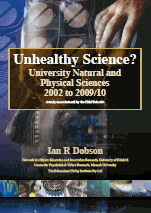|
|
|
|
|
|
|
News & Views item - March 2012 |
![]() The Day After the Release of Unhealthy Science? (March 1, 2012)
The Day After the Release of Unhealthy Science? (March 1, 2012)
 The
day following the Chief Scientist's release of Ian Dobson's report
Unhealthy
Science?: University Natural and Physical Sciences 2002 to 2009/10
the only public comment from a federal parliamentarian was from the Greens' Adam
Brandt. He opined that the low growth in maths and science enrolments shows
government policy is failing. He repeated the Greens call for budget cuts to
school science funding to be reversed and university fee discounts for maths and
science students to be restored because the growth in maths and science
enrolments are falling behind most other areas of education.
The
day following the Chief Scientist's release of Ian Dobson's report
Unhealthy
Science?: University Natural and Physical Sciences 2002 to 2009/10
the only public comment from a federal parliamentarian was from the Greens' Adam
Brandt. He opined that the low growth in maths and science enrolments shows
government policy is failing. He repeated the Greens call for budget cuts to
school science funding to be reversed and university fee discounts for maths and
science students to be restored because the growth in maths and science
enrolments are falling behind most other areas of education.
In Mr Brandt's view: "The Chief Scientist's report shows the government is failing to support maths and science education. Science and maths is central to innovation and will underpin our economic prosperity. We need to be doing everything we can to keep kids studying maths and science yet the government is doing the opposite. The government should be prioritising investment in science and research in the upcoming Budget and it should start by restoring programs that have been cut and restoring the fee discounts for maths and science students."
While a case can be made that the funding for fee discounting for maths and science courses could be better allocated, the simple axing of the discounting without redirecting the money to improve enrolments in maths and the enabling sciences is short-sighted in the extreme.
Meanwhile, the report's author, Ian Dobson, told the ABC the biggest growth in university enrolments was in management, commerce and health and added: "I'm not sticking the boot into management or accounting but that's not where technological growth and innovation comes from. They come from the basic sciences. So that's really just about the only reason why it's important. We need to make sure we've got a lot of people from which we can produce technologists and blue sky researchers. What people do at school is an important indicator of what they'll be doing at university. And we also know that we have fewer people doing physics, chemistry and maths - or proportionately fewer people - doing them in the senior levels of school."